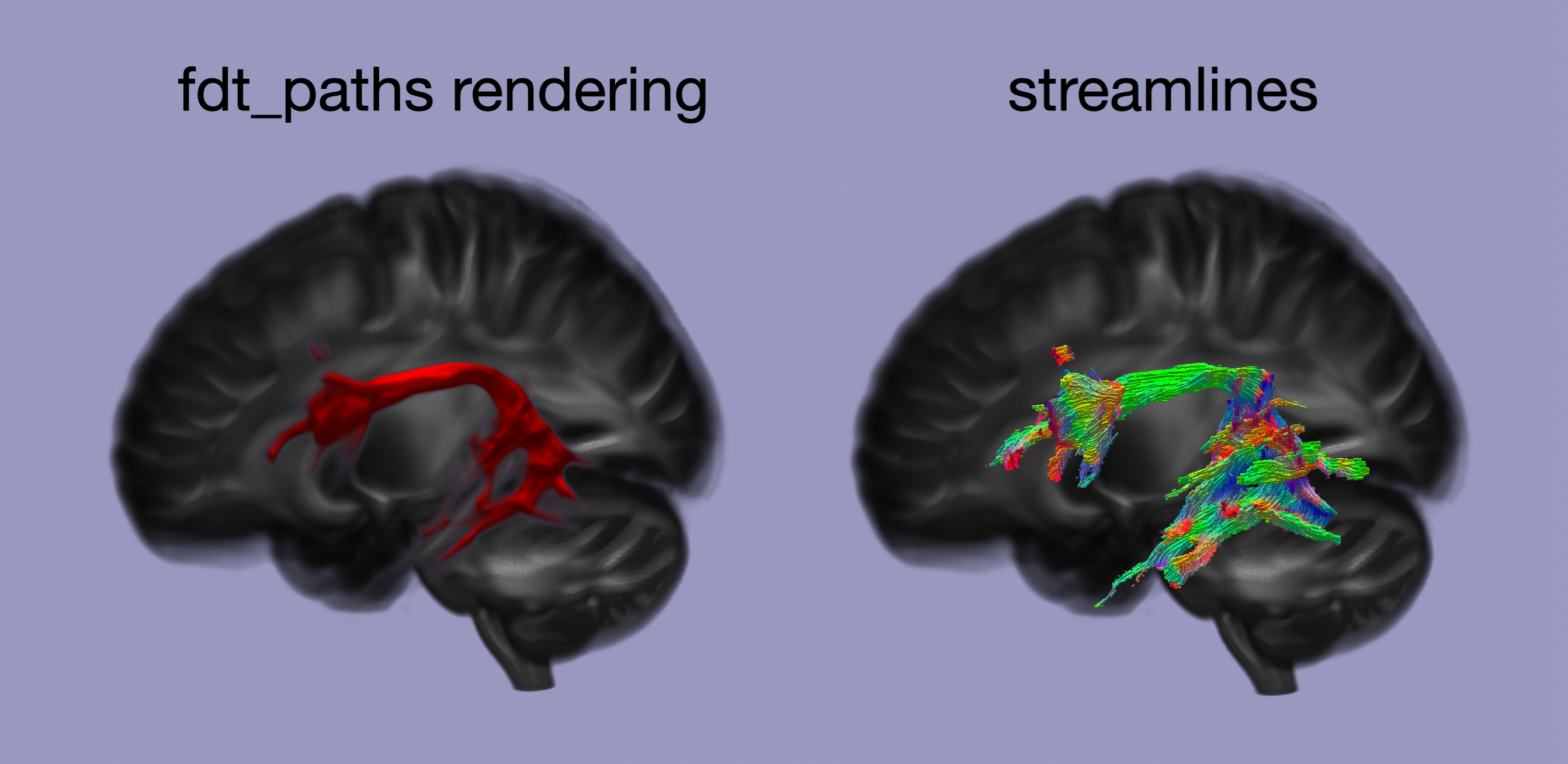fsl_streamlines
What is fsl_streamlines?
FSL implements probabilistic tractography (see probtrackx2 and its wrapper tool xtract). While this approach allows the quantification of uncertainty in the streamlining process, the resulting spatial histograms (e.g. fdt_paths in probtrackx2) are not easy to visualise, and are certainly not as aesthetically pleasing as what you would get from deterministic streamlining (e.g. figure below).

The fsl_streamlines tool can be used to generate streamline tractograms from probtrackx2/xtract outputs. It does so by running deterministic streamlining through a vector field saved by probtrackx2. This vector field represents the average orientation visited in each voxel. The streamlines are saved alongside their associated probabilities so that they can be thresholded during visualisation in FSLeyes.
Info
fsl_streamlines will be included in the next version of FSL (6.0.7.19).
Prior to running fsl_streamlines
The fsl_streamlines tool requires probtrackx2 to be run with the --opathdir option, which generates a fdt_paths_localdir.nii.gz file containing per-voxel average tract orientation:
If you are running xtract, you can pass on this option to probtrackx2 using a text file:
Running fsl_streamlines
There are three ways in which you can run fsl_streamlines:
- Using
probtrackx2output: the main input is one or moreprobtrackx2output folder(s). Thefdt_pathsandfdt_paths_localdirfiles are automatically detected. - Using
xtractoutput : the input is one or morextractfolder(s). - Using a "vector" file : you can run streamlining directly on one or more 4D vector files (e.g.
dti_V1fromdtifit)
The main output of fsl_streamline is one or more streamline files in .trk or .vtk formats. These files contain the coordinates of the vertices of each streamline, alongside vertex-wise scalar information (e.g. streamline probability from probtrackx2).
Viewing the streamlines in FSLeyes
To view the streamlines files in FSLeyes, see the documentation page on Tractograms and on how to view them in 3D.
Usage
Typing fsl_streamlines --help gives the usage:
usage: fsl-streamlines [-h] [-o OUTPUT_PREFIX] [-f {trk,vtk}] [-p PTX2_PREFIX] [-t DENSITY_THRESHOLD] [-min MIN_STEPS]
[-max MAX_STEPS] [-s STEP] [-j] [-spv SEEDS_PER_VOXEL] [-ss SUBSAMPLE] [-nj NUM_JOBS]
[-i {nn,trilinear,spline}] [--no-density] [-so [SAVE_OVERLAY ...]] [-rs SEED] [-v]
input [input ...]
positional arguments:
input XTRACT or PROBTRACKX tract directory/directories, or orientation file
options:
-h, --help show this help message and exit
-o OUTPUT_PREFIX, --output-prefix OUTPUT_PREFIX
Output file prefix (default: streamlines)
-f {trk,vtk}, --output-format {trk,vtk}
Output format - one of trk (default) or vtk
-p PTX2_PREFIX, --ptx2-prefix PTX2_PREFIX
File prefix for PROBTRACKX inputs (default: fdt_paths)
-t DENSITY_THRESHOLD, --density-threshold DENSITY_THRESHOLD
Threshold for streamline density (default: 1e-3). If density image is not provided, all voxels within
the tract are used as seeds (but --subsample is still applied).
-min MIN_STEPS, --min-steps MIN_STEPS
Minimum number of steps in a streamline (default: no minimum)
-max MAX_STEPS, --max-steps MAX_STEPS
Maximum number of steps in a streamline (default: 300)
-s STEP, --step STEP Step size relative to voxel size (default: 0.4)
-j, --jitter Randomize seed position within voxel
-spv SEEDS_PER_VOXEL, --seeds-per-voxel SEEDS_PER_VOXEL
If --jitter specified, number of random seeds to use per voxel (default: 1)
-ss SUBSAMPLE, --subsample SUBSAMPLE
Subsample seed voxels, e.g. if 10 consider only every 10th seed voxel (default: 1)
-nj NUM_JOBS, --num-jobs NUM_JOBS
Number of processes to use to parallelise streamlining (default: 1)
-i {nn,trilinear,spline}, --interp {nn,trilinear,spline}
Interpolation method for density values (default: nn)
--no-density Do not colour streamlines by density
-so [SAVE_OVERLAY ...], --save-overlay [SAVE_OVERLAY ...]
With --output-format=vtk, also save following volumes in compatible .vti format
-rs SEED, --seed SEED
Seed for random number generator (default: random seed)
-v, --version show program's version number and exit